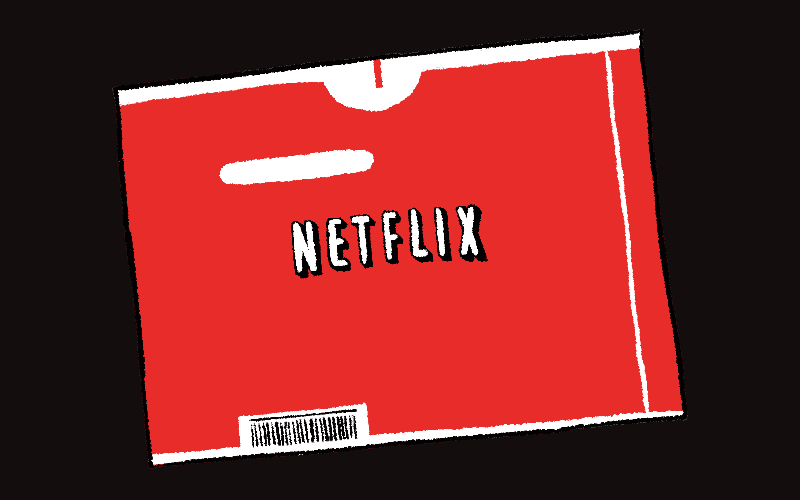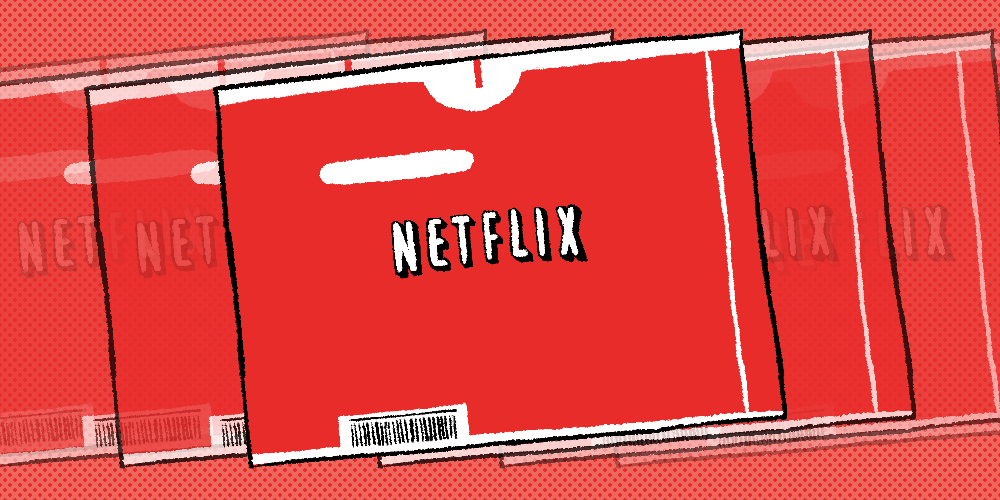I still remember my excitement that first time — the red and white envelope from Netflix arriving in my New York City mailbox like a present waiting to be opened. No more schlepping to a video store only to find out that the movie you wanted to see wasn’t there or, worse, that you and your friends couldn’t even agree on which movie to see. I sometimes think that half my weekends as a teenager were spent wandering the aisles of Blockbuster and debating whether to try a foreign film someone vaguely remembered or just watch Die Hard for the twelfth time.
Obviously, this occurred long before our current world where every film ever made is at your fingertips with algorithmic suggestions that make actual DVDs seem like a quaint and dusty relic akin to a gramophone. And it was quaint and dusty. You used to put all of the films you wanted to see into a list that Netflix dubbed the “queue.” Even at the time the word was redolent of some Victorian past in which each film waited decorously in line to be seen — such a calm, orderly concept. Its Britishness called to mind a magical Mary Poppins who would keep everything neat and tidy.
But the queue quickly became much more — a kind of running commentary on the state of my life. Much like books, the number of films I wanted to see far outran the number of films I had time to watch. But the beauty of Netflix was that it could keep track of all of those films for me until the queue itself became a kind of biography of the various phases of my life. After college, for example, I took a film class and was so moved by Yasujiro Ozu’s Tokyo Story that I immediately added every single film Ozu ever made — where they have remained ever since as a standing rebuke to my inconstancy. Every time I scroll by them, I can feel myself sink a little lower in my seat (Floating Weeds currently resides at #176 and is destined, let’s be honest, never to float to the top).
My relationship with Netflix, like any long-term relationship, has had its ups and downs. I dipped my toe in with a one-DVD-at-a-time plan, but I soon upgraded that to two. In part, this was because of a growing sense that I would never be able to keep up with my rapidly expanding queue, and in part, it was because it was hard to wait for a new DVD when I found myself binge-watching some seven-season TV show (full confession, I was bingeing back when that word was mainly associated with food). There was even a brief period when I escalated all the way up to an eight-DVD-at-a-time plan at which point I’m sure the Netflix algorithm targeted me as a shut-in. In my defense, I required it for medical reasons — or at least my wife did. She had such severe morning sickness that she spent several weeks lying in bed either waiting to throw up or recovering from having just thrown up. When you spend half the day clinging to the toilet, a good movie can really help pass the time, so I kept a steady stream of videos in front of her from the moment she woke up until the moment her head fell asleep on the porcelain rim of the bowl. How much video was she (well, we, because someone had to hold her hair behind her head) watching? We stumbled onto the original version of Upstairs/Downstairs (five years, sixty-eight episodes) and blew through it in under a week. I still date my slight English accent to that time.
What the queue most glaringly revealed, though, was my inability to choose serious films over mindless junk — what I like to think of as the Ozu problem. Inevitably, I would always choose Superman over Waiting for Superman (currently #197 in the queue), Bourne over Buñuel (The Discreet Charm of the Bourgeoisie at a woeful #327), Battleship over The Battleship Potemkin (a truly disheartening #456). To assuage my guilt about this, I often chose one “serious” film and one popcorn film. Invariably, the serious film sat on my mantle for weeks or even months as my other movie rotated among a pack of superheroes reliably traipsing through my living room. Clearly, I am not the type of person who watches Wild Strawberries (#257). Instead, I’m the type of person who likes to think he watches Wild Strawberries.
Of course, before there were apps to suggest movies, the queue also became my memory bank. Any film I came across that seemed worthwhile got placed into it. Unfortunately, that meant my queue became more of a dumping ground than a curated archive. Currently, the largest category by far is that of “Films I can no longer remember why I put in the queue,” such forgotten but potential gems as Shotgun Stories (#250) or Becket (#179) or Anonymous (#133).
It doesn’t help that I have two children and often am in danger of falling asleep before they do. Making it through an hour-long drama is no mean feat for me anymore, and I sometimes take several nights and much rewinding (given the interruptions and occasional mid-show naps) to get through one. Finishing a two-hour episode of Victoria the other day, I felt as if I had just made it through Lawrence of Arabia with a side of Bridge over the River Kwai. At my current viewing rate, I have calculated that I will reach the end of my queue in approximately eighteen years (if, that is, I can resist adding any more films to the queue).
And this problem has gotten completely out of control with streaming. It’s as if my not-so-well-ordered queue has been invaded by a barbarian horde that has no respect at all for the whole idea of the queue. Now, my queue problem has a queue problem. And my current DVD — a not particularly demanding Man from U.N.C.L.E. — has sat on my coffee table for so long that it carries the reminders of takeaways past, present, and future.
And so, I come to my final confession — my current queue count. It stands at 485 (not counting the dozens of films that are under-saved but have not been released or the massive cull I once did when Netflix informed me that my queue was full and could not be added to). I find it regularly mocking me with even greater severity than the shelf of unread great books sitting not far from where I am typing this.
But Netflix has saved me from myself. They have finally shuttered their DVD-by-mail service. I’m sorry Throne of Blood (#163) and Cowboy del Amor (#233), wherever you came from. Perhaps our paths will cross again on a transatlantic flight or if I am ever holed up in a post-apocalyptic bunker with a cinephile, but I doubt it. I failed you, but can you blame me? How can anyone hope to keep up with your rich treasures, your Hong Kong karate movies and spaghetti westerns, your Oscar nominees and Palme d’Or winners, your Torontos and Sundances, your Turners and Hooches?
I bid you a fond farewell and hope that if (as my daily meditation app tells me) meaning comes not from the destination but the journey itself, my queue has suggested an admirable desire to be the kind of person who could speak knowledgeably about the French New Wave. Isn’t my aspiration worthy of at least a single rotten tomato? Even if the answer is no, my queue will no longer be around to mock me with the gap between my movie-viewing ideal and the sad reality.

As the lights lower and the screen flickers, though, the promise of transcendence always seems close at hand. At least that’s what I tell myself as I curl up to enjoy some forgettable rom-com, even as I feel a brief pang of regret that I am not watching Floating Weeds and experiencing the ineffable sense of melancholy and loss that only someone as masterful as Ozu can capture.•




